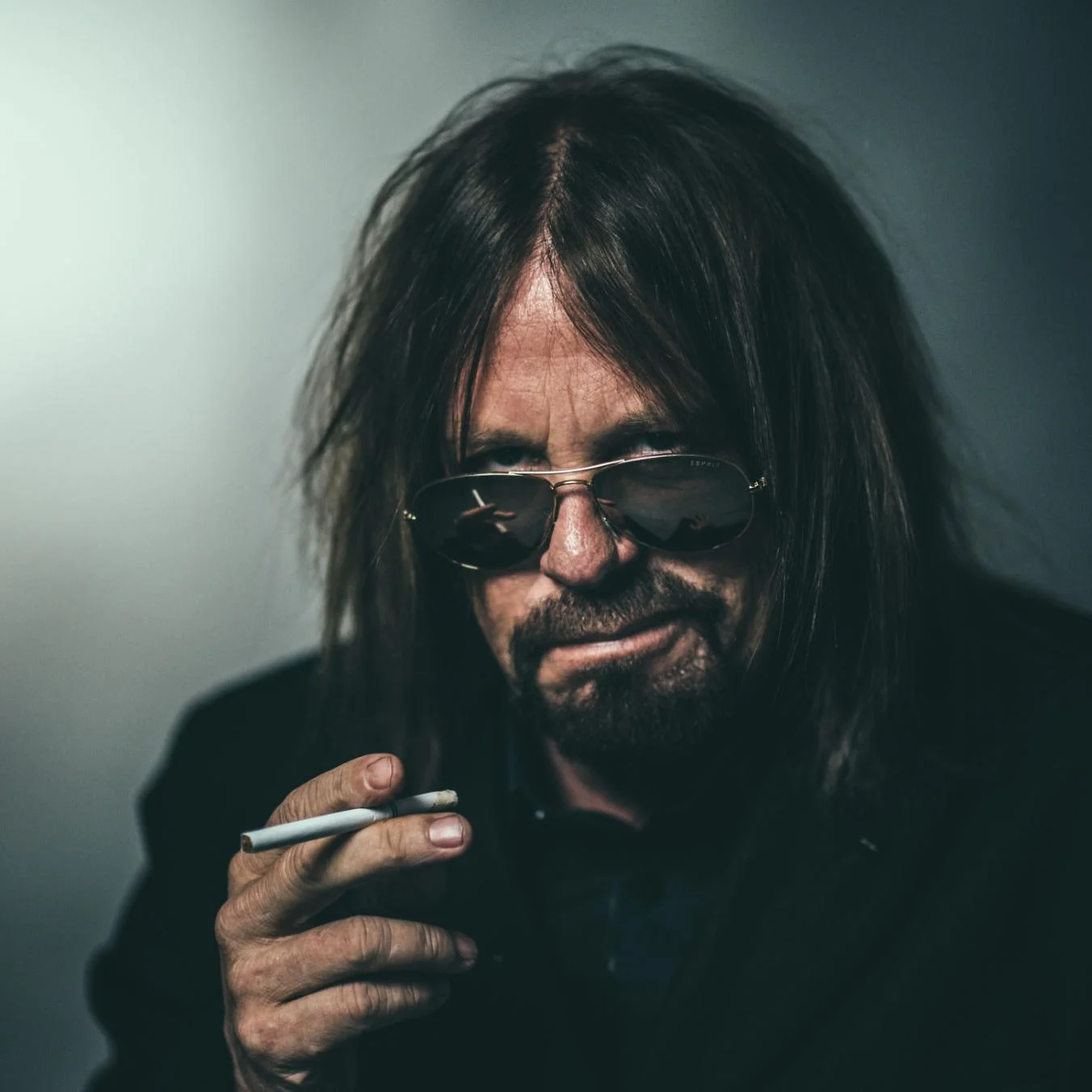
All images courtesy of Brad Sinsel/Header image credit: Ernie Sapiro
A survivor of ’70s glam, ’80s heavy metal, and ’90s grunge, the Seattle veteran’s willingness to shapeshift and boundless work ethic has left him one of rock music’s most endearing characters.
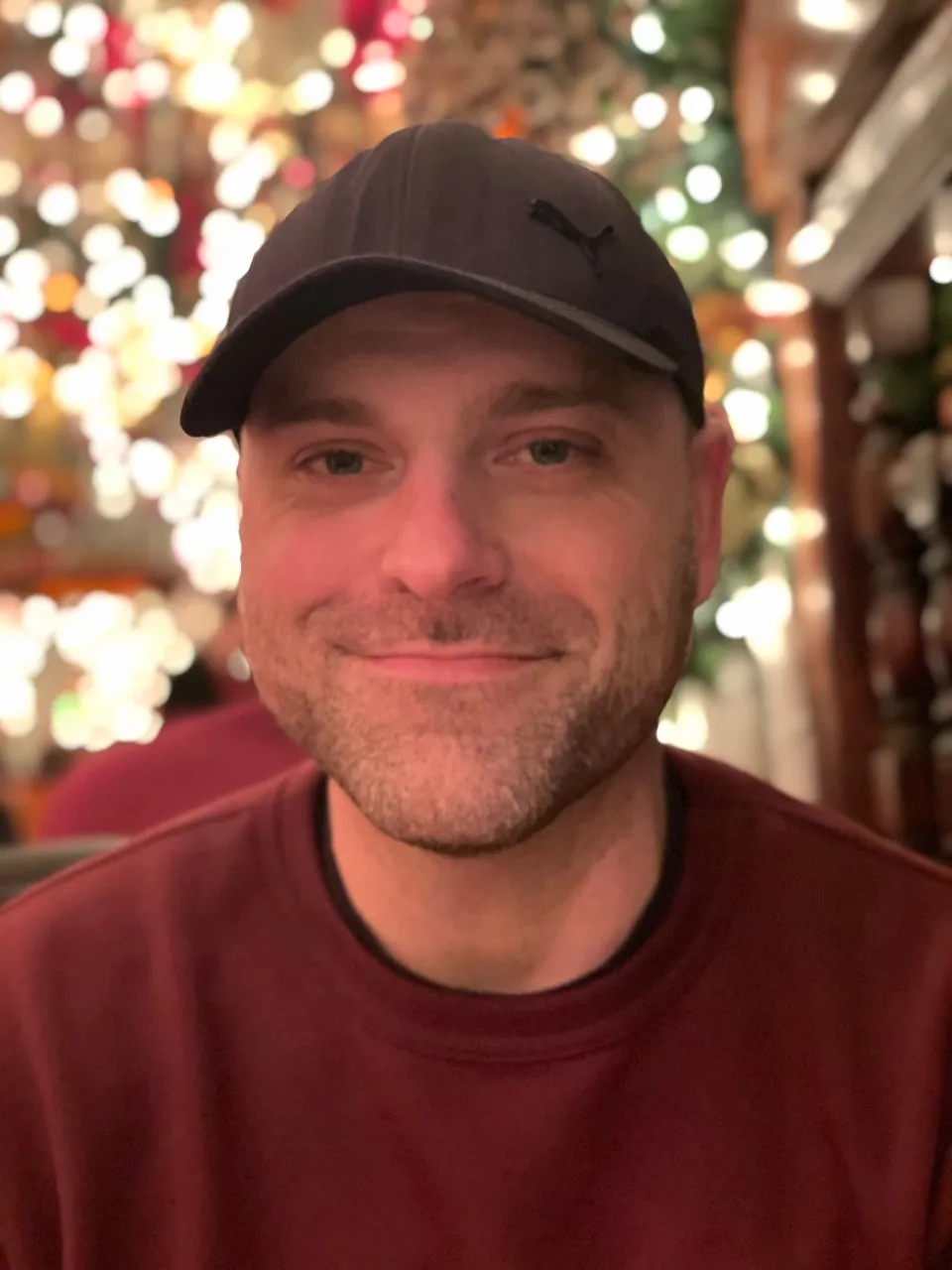
By Andrew Daly
[email protected]
No one would blame Brad Sinsel for packing it in, kicking music to the curb, and going home. But that’s not the Seattle scene staple’s style. Be it opening for the New York Dolls as a member of Ze Wiz Kidz or as a member of TKO, Sinsel’s reverence for rock music has never wavered.
Still, fans of glam rock and grunge alike seem to remember Sinsel best as the frontman for the eternally underrated War Babies, a band that was deadset on melding the dueling genres together. Accordingly, War Babies’ self-titled debut remains a cult classic, but in many ways, it is also a record for the ages that has been sadly lost to the sands of time.
None of that matters to Sinsel, though, as these days, he’s as busy as ever working on his latest project, Angels of Dresden. But Sinsel has never forgotten where he came from or the music he once held so dear, and recent years have seen TKO reunion shows and renewed contact with his former War Babies cohorts.
As a casualty of the early to mid-90s grunge explosion, Sinsel would be the first to tell you that hindsight is 20/20. And while he might have done some things differently given the chance, Sinsel harbors few regrets, instead choosing to remain thankful for his place in the pantheon of rock history.
Ever busy, Sinsel took a moment with me to recount the formation of TKO, his memories of the infamous Seattle grunge scene, and what he has in store for the 30th anniversary of the War Babies’ debut record.
What first sparked your interest in rock music, and when did you know you wanted to make it your career?
My earliest memory of music was being sent out of the room during an Ed Sullivan Show broadcast of Elvis Presley. This had something to do with his swiveling hips, I suppose. [Laughs]. So, that in itself piqued my interest; once you tell me I can’t do something, that’s the first thing I’m gonna do. Once again, with the Ed Sullivan Show, it was 1964, and the Beatles made their debut on that show. I got to stick around on that one, and that’s when it hit me. It was a monumental shift from the look to the sound to the reaction of the crowd, not to mention the screaming girls. My first thought was, “That is something I have to do.”
Describe the scene you were exposed to growing up.
Music was always a part of my home. My mother was a torch singer during the big band era; I remember music was always playing, and she was always singing along. By the time I was 12, I had my first band, just myself, a drummer with a snare drum and one cymbal, and a guitar player who didn’t play chords. [Laughs]. It took a while, and things expanded; before I knew it, we played dances. Even though we only knew four songs, we would play them all and then repeat. This explains why to this day; I can’t dance; I was always playing music for everyone else. And then there was the period between 1966 in 1969 when musically everything was changing rapidly. I graduated from the Beatles to discover Eric Burdon and the Animals, who to this day continue to influence me. From there came the blues revival via Cream, which led me down a deep dark path of American blues; as of today, it remains a part of my toolbox.
What are your memories of opening for the New York Dolls with Ze Wiz Kidz?
Rick Pierce and I had moved to Seattle and started a band that was playing anything from Alice Cooper, The Stooges to Bowie. Ze Whiz Kidz was an androgynous comedy troupe that wanted to enter the music field. Our band was a perfect fit, given our goal was shock and awe. I was 19 at the time we received an invite to open up for the New York Dolls, who at the time were at their apex. If I recall correctly, I only sang two or three songs during that show, but it was my first major theater show. It was at a spot called the Moore theater in Seattle, for which I have a long and loving history. Of course, the show was panned by the local rock critic, who was dismissive and on his way to a Ravi Shankar concert. [Laughs].

All images courtesy of Brad Sinsel
How did Ze Wiz Kidz give way to TKO?
After the Dolls show, we disbanded, and I headed back to Yakima, WA, to join forces with Tony Bortko and Bill Durham. Our plan was to create an art rock project/rock opera we called P.O.W. We did some recording which fell on deaf ears, so a new plan had to be put into motion. Meanwhile, Rick Pierce had joined forces with Seattle legends Mojo Hand, a more straightforward rock with a swampy, blues edge. They were managed by promotor Ken Kinnear, who, at that time, was the manager of Heart. Well, by 1976, P.O.W. had ended, and Tony and I returned to Seattle. And Mojo Hand was seeking a singer and guitarist who could also handle keyboards. So, Tony and I were approached probably because of the Pierce connection and because we all hailed from the Yakima area. As it turns out, I failed the audition, but they still wanted Tony, who, legend has it, gave the ultimatum that we were “a matching set,” and voila – I was in.
What did TKO’s look like leading to the early deal with Infinity Records and recording Let It Roll?
We played the club circuits in the northwest to get by while attempting to put an album together in our spare time. It took at least a year before we began to find our footing, and songs began to come together. By ’78, Kinnear introduced us to Mike Flicker, Heart’s producer, and we were offered a deal that led to a mad dash to write an entire album. The bulk of the music was created by Tony and Rick, while I handled the lyrical end of things. Prior to Infinity, we performed a live simulcast which was broadcast add Seattle’s KZOK FM station. This caught the attention of Ron Alexenburg, Infinity’s president, and the rest is history.
Our deal with MCA was what is known as a “production deal,” with us being signed to Kinnear’s company, Albatross Records. It was all done swiftly and sterilely, whereby we never met Alexenburg until the tours began. Let It Roll was a year in the making and was recorded in Seattle at Rick Keefer’s Sea West Studios. It was coincidentally the same spot Heart was recording Dog & Butterfly. Our debut was rough in that, as tradition dictates, managers love to send their new acts out to open for The Kinks. That’s a fucking tough crowd. [Laughs].
How did your time on the road with AC/DC, Cheap Trick, Van Halen, and The Kinks alter your perspective?
Being an opening act, you learn to grow a pair or perish. [Laughs]. As a frontman, I learned to start with the front row and work my way to the last seat in the back. You learn skills as an opener that you carry with you as a headliner; my favorite being: never let ’em see you sweat. And no matter what size the room, the same rules apply. My fondest life-changing memory was when we played the Mississippi River Festival with Heart, Nazareth, UFO, and AC/DC. This was when Highway to Hell had just peeked at No. 1. So, TKO opened the show, followed by AC/DC, who mopped up the stage.
It was crazy; here they were juxtaposed to Heart and their costumes; the crowd went mad and simply never recovered. The headliners were Heart and Nazareth, mind you, but the promoter thought it funny to add all these alphabet bands: UFO, AC/DC, and TKO. He didn’t see it coming. [Laughs]. Back to the best memory; while backstage, you’re issued a wristband indicating what level of service you will receive backstage. Well, I apparently was in the wrong tent, as was Bonn Scott when we were politely asked to leave, given we had the wrong wristband. One never knows! [Laughs].
How did the introduction of Adam Brenner alter the sound of TKO during the recording of In Your Face?
TKO’s long history of lineup changes began in July of ‘7’9, with Darryl Seguenza and Mark [Seidenverg] leaving, replaced by Bill Durham (drums) and Evan Sheeley (bass). This was one of my all-time favorite lineups, as everyone in the band was from Yakima. Our first show was the Japan Jam, and that was incredible, but later in the fall, Infinity/MCA folded, and things got rough. Early in 1980, the stress of things saw an exodus of members, and slowly but surely, Evan, Bill, and I was left holding the bag as Tony left, leaving us with Adam Brenner in his place.
It was the year of the “wang bar,” and Adam being in possession of the first prototype, had everything we needed. I was more interested in what he came up with when he used his Flying-V or Les Paul, given it was more in the vein of Jimmy Page, and within that, we found a compromise. We eventually added Gary Thompson on drums and took off as a three-piece that often broke out into improvisational jams that I loved, given my history. Music was changing; with Judas Priest and Iron Maiden coming to the front, we had sonically adjusted accordingly. We struck another production deal, this time with Rick Keefer, and recorded In Your Face in early 1981 at Sea West Studios in Hawaii. The demo started leaking out as Keefer continued to be met with label resistance.
“End of the Line” saw TKO erring toward a heavier sound. Was that a reflection of the band trying to keep up with the emerging metal scene?
Yeah, I’d say so. So, about a year later, TKO, still without a label, found a home within the underground tape-sharing world. This, in part, was thanks to James Tolin for pushing it into the right hands. The scene continued the path of heaviness, and we certainly were in step with that trend. We had to go with the flow because production deals during that time were frowned upon, as it kept powers of choice in the producer’s hands. Labels wanted that power, and being signed to that agreement was our Achilles heel. Keefer began desperately striking regional deals in the U.K., Sweden, and Japan, finally landing with Combat/Relativity.

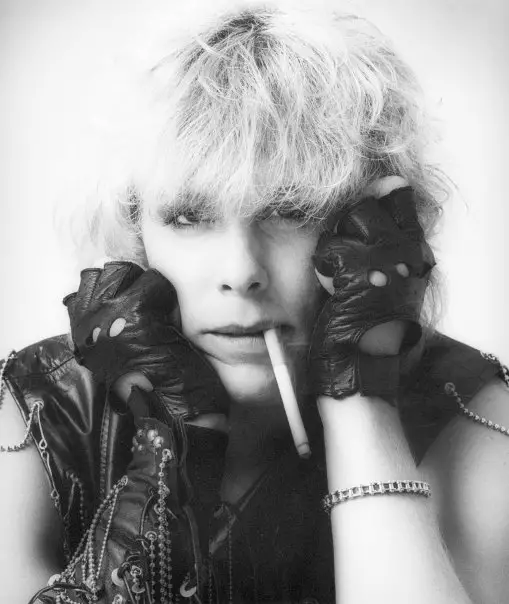
All images courtesy of Brad Sinsel
What led to the fracture after the recording of Below the Belt?
We underwent yet another lineup change as Adam left to pursue his solo career. After that, Evan, Gary, and Pierce fled to Floyd Rose’s Q5, leaving me the last man signed to that horrendous production agreement. In ’85, Keefer contacted me, and I got my marching orders to tour in support of In Your Face, with a new LP on the horizon. I explained, “No can do. I have no band.” [Laughs]. His answer? He basically said, “Brad, you’ve got two weeks to come up with one.” So, I left San Fransisco and headed back to Seattle, and by the end of two weeks, I had secured Scott Earl, Kjartan Kristofferson, and Ken Mary.
Things were running smoothly with high energy levels, and after a brief tour, we headed back to Hawaii to record Below the Belt. Once recorded, we returned to Seattle only to find ourselves waiting on a release date. Meanwhile, we did dates with Dio and Foreigner but again, the production deal reared its ugly head. Nobody wanted to sign on for that madness, the strain proved to be too much, and we lost Ken Mary. We replaced him with Michael Alex and hung on as long as possible before eventually folding.
In the wake of TKO disbanding, Suicide Squad came to be. How important was Live it While You Can to you joining War Babies?
So, Combat/Relativity offered me a solo project aside from Keefer. The contract was expiring, so I grabbed Rick Pierce and Richard Stuverud and headed to a Seattle studio to record a demo. The label loved it, but when they asked for how much I was asking, I referred to the last contract I’d signed with them. And although A&R said “Okay,” president Barry Cobrin ultimately offered much less. I sent it off to Music for Nations, who offered substantially less, but I felt confident in their commitment. A year later, I spoke with Barry, who said, “I love the new EP!” I said, “You should’ve picked it up,” he remarked, “Do you know I owe controlling interest in Music for Nations?” It turns out that we’d have made much more money had I gone with Combat/Relativity. So, hindsight is 20/20. The link from Suicide Squad lies with Richard Stuverud, who later approached me to sing for War Babies.
In War Babies’ early days, you gigged around Seattle alongside Mother Love Bone, Alice in Chains, and Pearl Jam. Do you agree with the assertion that grunge killed metal?
I had returned from Los Angeles and took over as frontman for the War Babies, who, at the time, were playing the typical Seattle venues such as the Central and the Vogue. Once again, music was changing, and somehow we found ourselves accepted in that musical community. I had surfed through numerous shifts in style in my lifetime; I felt like War Babies was a perfect fit during those changing times. I mean, we were all signed to the same management company, our audiences were the same, and we partied and played together as one big family. I don’t think grunge killed metal; I think it overstayed its welcome. As to whether or not change is a good thing, I cannot say. Had we all stayed in Seattle, everything would be just fine today; it’s when it went global that we found that disconnect.
The death of Andrew Wood shook the scene to its core. What are your memories of him, and how did his death affect the scene on the ground level?
Andy was special; I hadn’t really seen the likes of him since Jim Morrison. He loved all things rock ‘n’ roll, everything about it. At the time, I found that refreshing, being that I was starting on my sixth album and couldn’t see the good in any of it. I remember there was a party at manager Kelly Curtis’ house, and all the guys from Alice, Love Bone, and War Babies were there. So, Andy cornered me and enthusiastically asked me questions about life on the road, such as, “What’s it like on a tour bus? Is it great?” I found myself gilding the lily and did my best not to tarnish that pure, naive individual who, to me, was simply magical. The shock of his death deeply affected Seattle; looking back, it had a musical impact whereby chords, melodies, and rhythms clearly, and deeply darkened.
Jeff Ament was an early member of the band. How did he become involved, and what led to his departure?
War Babies signing to Columbia Records coincided with the passing of Andrew Wood and the consequential demise of Mother Love Bone. Their bass player, Jeff Ament, needed a job, and War Babies needed a bass player. Kelly approached us with the suggestion to bring Jeff on board. It was all done in-house. He basically was a salaried player doing some live shows and some demo work as well. Within a year, Jeff and Stone Gossard reconnected, forming Pearl Jam. We hired our third base player following his departure; the rest is history.
Had Jeff elected to stay, I’d venture to say that Pearl Jam’s rhythm section would not have the infamous signature it has today. Ultimately, our outcome would have been the same if he had stayed with War Babies, as grunge was clearly an unstoppable freight train. I’ve been involved with recordings with Stone as well as Mike McCready has contributed guitars on a few songs from my current project, Angels of Dresden, in exchange for my appearing on his charity event “Flight To Mars.” This summer, of course, Rich [Stuverud] filled in for Pearl Jam drummer Matt Cameron during their tour dates, so safe to say, to this day, we all stay in contact in contact.
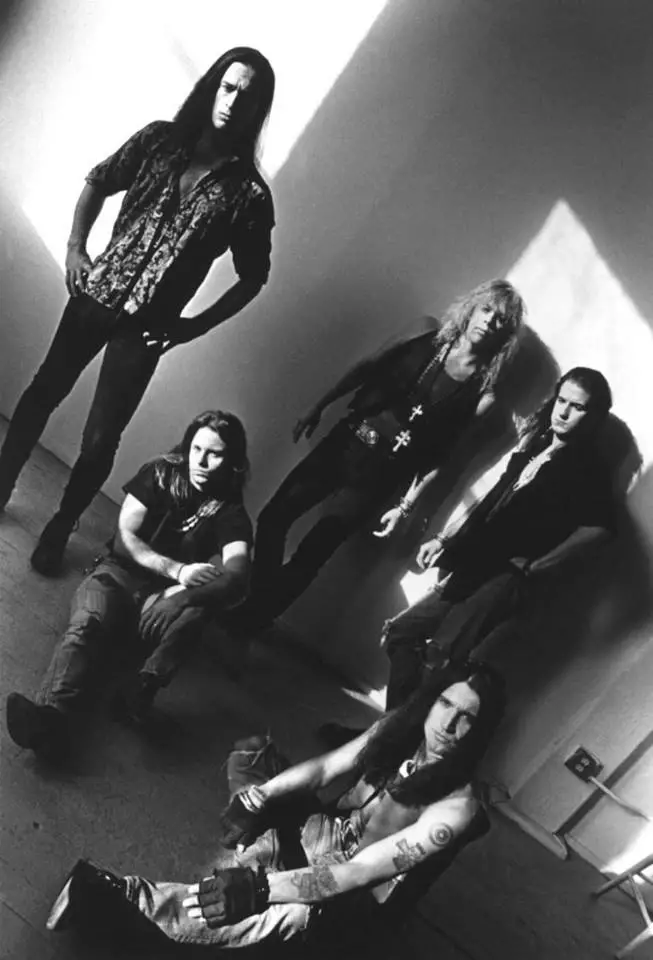
All images courtesy of Brad Sinsel
What are your memories of the recording of War Babies?
We chose Thom Panunzio to produce and Bill Kennedy to engineer at A&M studios in L.A., which was our home for a few months. That facility is rich in history – formerly Charlie Chaplin’s studio – and it was inspiring to us all. Although there was a buzz in the air that perhaps there was something to this grunge thing, I think the labels hedged their bets in signing us as leverage against their investment in Seattle. I remember the sessions had visitors who would show up to listen and see what was happening. The most notable was Alice Cooper, whom I found to be a great guy, and we both had Ken Mary in our history to discuss and agreed we loved him but wished he’d pick which band he wanted to be in. [Laughs].
How did Paul Stanley enter the picture?
The basic tracks were recorded in Studio A, a mammoth room, and it gets credit for the amazing drum tracks, as it’s sonically huge. During this time, Sony Publishing asked Tommy and me to branch out and start working with other writers. We both worked separately with Paul Stanley, with Tommy and Paul penning “Hang Me Up” and Paul and I with “Cry Yourself to Sleep.” Both songs ended up on the album and are some of the most well-loved. We also added Benmont Tench, keyboardist for Tom Petty, on the track “In The Wind,” which was an amazing experience. That guy absolutely knows when and what to play and when not to. The band at that time was at our apex, which I credit to all those live Seattle shows leading up to the recording process.
Do you feel the reason for War Babies’ lack of commercial success can be attributed to fans misunderstanding the band’s sound?
With the album done, we were set to launch in 1991; however, in its infinite wisdom Donny Ienner and his Columbia machine held back the release citing that, “We would be better off holding off as Michael Jackson was planning to launch his latest, Dangerous.” Well, that Michael Jackson album would end up eating all of our advertising budget and proved to be the death nil for us. Had we launched when we were ready, I believe the world would have been ready to receive us. But by the time War Babies was released, it was 1992, and the landscape had changed. Again, everything would’ve been fine if the decision-making had been held back in Seattle.
Was Columbia’s mismanagement what led you to leave War Babies?
The capitulation was fast and clean. You had the inner workings and relationships between the band and label messing with the core, which certainly didn’t help. In typical industry fashion, the words, “You’re beautiful, baby,” pass like the wind. I myself was spinning through a divorce and wasn’t handling things in the best way; push came to shove, and I was out. They carried on without me but soon folded. It’s sad because it was a great fucking band.
Thirty years later, War Babies is warmly remembered. What are your plans for its anniversary?
We are currently in talks with Rock Steady Records to release the album again, with the focus on songs recently unearthed as bonus tracks. By the end of things, Tommy and I were at loggerheads, but we have since moved on. I’ve had them out on some TKO reunion shows doing cameos, and we’ve had a blast. We’re in contact with Guy Lacey, and as I said, Richard Stuverud filled in for Matt Cameron during the recent Pearl Jam tour. How perfect is that? We’re all discussing live dates as we speak, and if we only return to Seattle, that’s fine by me. The bonus tracks are my favorite thing about this release, and I truly hope you all enjoy them.
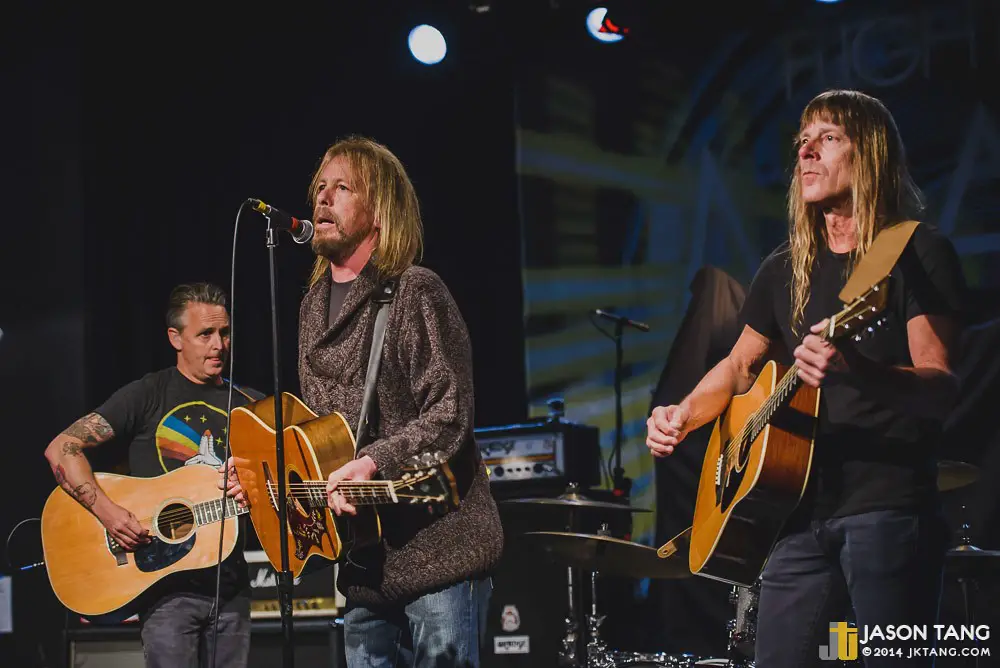
All images courtesy of Brad Sinsel/Image credit: Jason Tang
– Andrew Daly (@vwmusicrocks) is the Editor-in-Chief for www.vwmusicrocks.com and may be reached at [email protected]

That was a great read… learned a lot of deatils about the scene, and Brad’s history, that I’d never known. The War Babies album is classic.